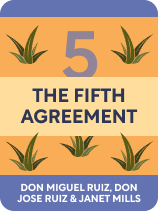

This article is an excerpt from the Shortform book guide to "The Fifth Agreement" by Don Miguel Ruiz. Shortform has the world's best summaries and analyses of books you should be reading.
Like this article? Sign up for a free trial here .
What are the five agreements? How do they change the way you see everything? Where do they lead?
In The Fifth Agreement, authors don Miguel Ruiz and don Jose Ruiz outline the five agreements that you can make with yourself. These agreements transform how you perceive the world and your place in it. The authors believe that, if you practice these principles, you’ll rediscover your true self and reclaim the wholehearted love, joy, and freedom that you enjoyed as a child.
Keep reading for details about the five agreements.
The Five Agreements
We’ve learned that we don’t have to continue to hold the harmful beliefs society has taught us and what our lives can look like when we’re free—now, let’s explore how to shed those beliefs and achieve freedom.
The authors present a five-step process to escape the mirage of “the real world” by reframing your perspective to adjust your reactions to the messages you receive. By practicing the five agreements in your own life, the naguals say, you begin to reconnect with your needs and desires and reclaim the freedom to be satisfied with yourself as you are. In other words, what follows is the Toltec road to enlightenment.
(Shortform note: There are many paths to discarding self-limiting beliefs and reclaiming a feeling of self-worth, and the Toltec road is just one of these. For example, cognitive behavioral therapists specialize in mindset-change—helping clients adjust the way they think about themselves and their day-to-day lives to gradually eliminate self-criticism and shame.)
Let’s look at each of the five agreements in detail.
Agreement 1: Be Impeccable With Your Word
The first step in the Toltec process is to be impeccable with your word. In the mirage of “the real world,” we use words to denigrate, criticize, and attack not just those we dislike, but our friends, our children, and even ourselves.
“Use your words wisely” means don’t weaponize your words against yourself. Don’t describe yourself in hurtful ways, inside your head or aloud—for example, by telling yourself you’re ugly, stupid, or a failure. When you do that, you accept those messages as truth and make those negative beliefs a part of your reality. It’s no wonder you’re not happy when you see yourself that way. Instead, allow yourself to be as you are without judgment—nothing about you is inherently imperfect, even if you’ve been taught to believe otherwise.
(Shortform note: Another important thing to remember is that self-criticism typically doesn’t reflect reality. For example, psychologists note that those who self-criticize often feel that they receive less support from others, that they’re less attractive, and that they’re less happy than others. However, studies show that in most cases, these feelings don’t reflect their reality—instead, the tendency to self-criticize trains us to overestimate the negative aspects of our experience and underestimate the positive.)
Further, let others be as they are, too: Don’t externalize the voice that hurts you. The authors say that when you use your words against others, to spread gossip, criticism, or hurt, you’re not using them wisely. You further the hurt others already feel and push them to conform to the harmful societal beliefs you’re attempting to move away from. Additionally, you invite a future in which that hurt comes back to you as mistreatment. Respect the power your words can have, over others as well as yourself.
(Shortform note: When you use your words to hurt others, you risk starting long-term conflicts. In The Anatomy of Peace, the Arbinger Institute explains that when we provoke, demean, and infuriate others, we motivate them to respond in kind and initiate a cycle of mistreatment. As the cycle continues, we stop seeing them as people, instead seeing them as distasteful objects that can’t be reasoned with. Over time, the conflict festers and grows, dragging in those around us as we grow further and further apart. Do others the courtesy of seeing them as people, with needs, struggles, and hopes of their own—you’ll find it harder to justify using your words and actions to hurt them, and that will keep you out of cyclical conflicts.)
Agreement 2: Don’t Take Anything Personally
The second of the five agreements is to understand that the words and actions of others are based on their own relative perceptions: They’re not actually about you. So, don’t take anything personally.
Why is this the case? Because, as we’ve discussed, we all live in our own private world. We see things differently and we hold our own subjective beliefs. The authors explain that due to this subjectivity, everyone you know has an image of you in their head wholly based on their subjective perception of you and your actions. This image includes assumptions about who you are, what you think, what your life is like, and what you’re good and bad at.
Ultimately, these assumptions can’t possibly reflect the truth of who you are because nobody has a clue what’s going on inside your head.
| People Don’t Know You As Well As You’d Think The naguals say we shouldn’t take it personally if others don’t see us for who we really are because, bluntly, nobody can. In fact, Dr. Heidi Grant Halvorson, author of No One Understands You and What To Do About It explains that we think others know us better than they really do. We assume anyone can tell what we want, what we think, or what we mean—but that’s not the case at all. It’s possible for someone to get close, but it takes so much effort that most people won’t bother. The mental picture others have of us, Dr. Halvorson says, is built by a two-part system of thought. “System one” thinking is automatic, hasty, and reflexive; people engage system one when they see a small slice of us and make a series of snap judgments. In contrast, “system two” requires conscious effort and focused intent; people engage system two when they deliberately put aside their snap judgments and get to know the real you. Often, people don’t use system two at all: Unless they make an intentional effort to be open-minded, they go with their first impulse and leave it at that. Even those who make the effort are still missing a lot—they only see what you show them and they may not eliminate all their assumptions, biases, and filters. Take the perspectives of others with a grain of salt. |

———End of Preview———
Like what you just read? Read the rest of the world's best book summary and analysis of Don Miguel Ruiz's "The Fifth Agreement" at Shortform .
Here's what you'll find in our full The Fifth Agreement summary :
- The five “agreements” to make with yourself that adjust your outlook
- How to rediscover your true self and recapture the freedom you felt as a child
- A five-step process to escape the mirage of “the real world”






